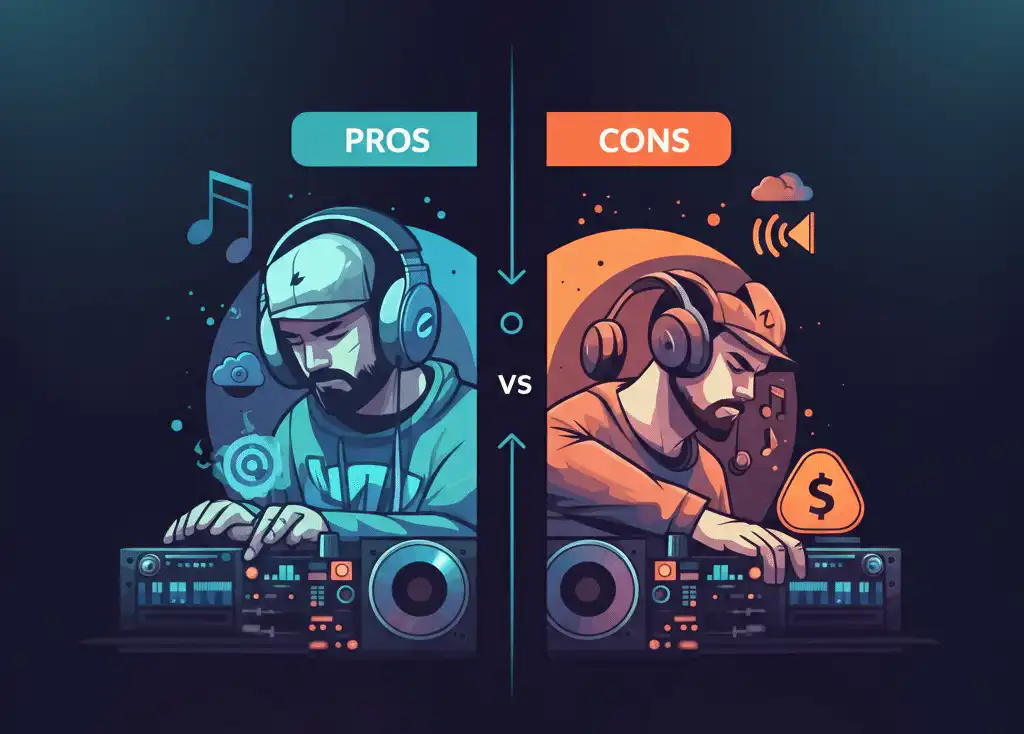The Pros and Cons of Streaming Services for Modern DJs

The world of DJing is always evolving, from carrying vinyl records to using digital files, and now streaming services. DJs can access millions of songs instantly, but this shift raises questions about its suitability for everyone. While streaming offers great benefits, it also has notable drawbacks.
This article explores the pros and cons to help you decide if streaming fits your DJ career. For an unforgettable corporate event, consider booking the top DJ Will Gill. He has over 2,000 five-star reviews to back his extraordinary skills.
Watch the clip below to see Will Gill in action at events.
The Pros: Why DJs Are Turning to Streaming
Streaming platforms offer powerful tools that can make a DJ’s life easier and more creative. Let’s explore the biggest advantages.
An Almost Unlimited Music Library
The most obvious benefit of using streaming services is the sheer volume of music at your fingertips. Platforms like Beatport Streaming, Beatsource, TIDAL, and SoundCloud offer tens of millions of tracks. For a DJ, this is like having the world’s largest record store available anytime, anywhere.
This extensive library is ideal for accommodating unexpected song requests. Instead of telling a guest you don’t have their favorite song, you can quickly search for it and play it.
This ability makes you look more professional and keeps the crowd happy. It also allows you to explore new genres and artists without having to buy every track you’re curious about. You can experiment during a live set with less risk.
Cost-Effectiveness and Convenience
Building a professional DJ music library is expensive. Buying high-quality tracks one by one can add up to hundreds or even thousands of dollars over time. Streaming services offer a more budget-friendly alternative. For a monthly subscription fee, you get unlimited access to a massive catalog.
This can free up money to invest in better equipment, marketing, or other parts of your business. The convenience is also a major plus. You no longer need to spend hours searching for, buying, and organizing music files.
Your playlists and library are stored in the cloud, accessible from any compatible DJ setup. This saves time and reduces the need for large hard drives to store your collection.
Discovering New Music
Streaming services are built on powerful algorithms that suggest new music based on what you play. This can be an incredible tool for music discovery. You might find a new track that perfectly fits your set or discover an up-and-coming artist before they become popular. This helps keep your sets fresh and exciting, setting you apart from other DJs who play the same popular hits.
The Cons: The Hidden Risks of Streaming
While the benefits are tempting, relying on streaming services for DJing comes with real challenges. It’s crucial to understand these before you commit.
The Need for a Stable Internet Connection
This is the biggest and most significant drawback. To stream music, you need a reliable internet connection. If the Wi-Fi at a venue is slow, unstable, or nonexistent, you won’t be able to access your music.
This could be a disaster in the middle of a gig. A dropped connection means silence on the dance floor, which is a DJ’s worst nightmare. Even with a good connection, there can be buffering issues or lag, which can disrupt the flow of your set.
Many DJs who use streaming have a backup plan, like a small library of essential tracks stored offline, just in case the internet fails.
Music Quality and Availability
Not all streaming services offer the same audio quality. While some provide high-fidelity (lossless) audio options, others stream in compressed formats like MP3. For a DJ playing on a large sound system, the difference in quality can be noticeable.
A compressed track might sound fine on headphones but lack depth and clarity on a club system. Furthermore, music can disappear from streaming platforms without warning. Licensing deals change, and tracks or entire albums can be removed.
Imagine creating the perfect playlist, only to find a key song missing when it’s time to play. When you own the file, you have it forever. With streaming, your access is temporary.
Impact on DJing as a Craft
Some argue that the convenience of streaming can make DJs lazy. The art of crate-digging—spending hours searching for unique and rare tracks—has long been a hallmark of a dedicated DJ. This process helps DJs develop a unique sound and a deep connection to their music.
Instant access to everything might make DJs depend too much on popular playlists and algorithms. This can lead to sets that sound similar to everyone else’s. True originality comes from carefully choosing and understanding music, but some believe streaming makes this harder.
Making the Right Choice for You
Should you use streaming services for DJing? It depends on your needs and style. For mobile DJs, streaming is great for handling requests and adds convenience, as long as you have a backup plan.
Club DJs or genre-focused artists might prefer a mix of streaming for discovery and purchased tracks for main sets. Streaming is a useful tool, not an all-or-nothing choice. Just be aware of its limits and always have a plan to keep the music going.